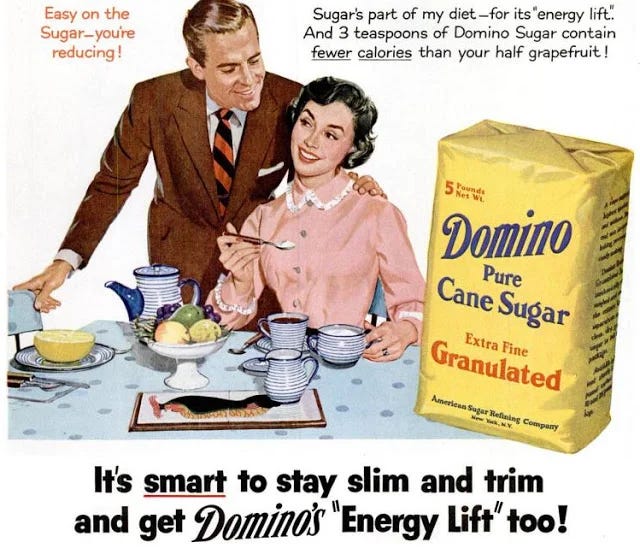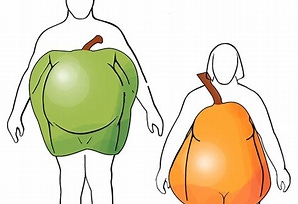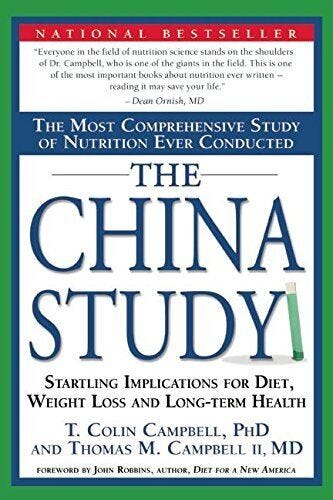The usefulness of fat: Redux
originally posted in May 2023
Dear Sober-Minded ones. As has been my recent habit, I’m reposting an essay from approximately a year ago. I had comments turned off as I was in the early stages of building a readership and didn’t have many subscribers. Substack friend
and I were riffing in comments this morning and I thought it was time to repost this one.The content within this essay contains my own personal experience with food and weight. Everyone’s relationship to food is different and individual. One major point that I make in this essay is—food is used as a coping mechanism—much like alcohol or drugs. Our relationship with food is significantly different than either alcohol or drugs or nicotine or other substances that we may use to cope with the discomfort in our lives. We must eat—while we can most certainly do completely without the others. That makes the discussion not about abstinence—but instead about moderation, healthy choices, and our relationship with food.
Please enjoy a little cultural history and my own experiences with food.
Fat keeps us warm and comfortable. Fat protects us. Fat makes for a softer seat. Fat is ubiquitous in our lexicon. Fathead. Fatass. Fatfuck. Fat wallet. Fat cat. Fat shaming. Chew the fat. Not until the fat lady sings. Phat! It singlehandedly keeps our sick-care system functioning. Fat kills us off quicker. Fat drives multiple billion-dollar industries.
Fat is useful.
Portliness and heftiness were a symbol of wealth and status for centuries. Only fairly recently has fat been considered an insult. In our current culture of body acceptance, girth has become celebrated again. For the last couple of centuries, rotund Kings and leaders of state and industry were well-stocked and well-fed. Round representatives of large living. As W.F. Ferris and N.J. Crowther explained in 2011 research, excess body fat was a symbol of wealth and prosperity as the general population struggled with food shortages and famine, as we can see in Renaissance portraits celebrating full-figured women. Technology and industry in the 19th and 20th centuries made food stabler, cheaper, and more widely available as well as increased the overall standard of living—but that came with more sedentary lifestyles and processed foods, creating new concerns about weight.
That began to change in the late 1950s when skinny began to take over as a new fashion ideal and a new symbol of health and beauty—the old words for today’s wellness. During that time, obesity was credited to gluttony, and a very small percentage of Americans were considered to be technically obese—maybe 2-3%. The diet industry was born. The Twiggy era of the 1960s reached its peak when Dame Lesley Lawson (Twiggy) was named Face of the Year by the British tabloids. Twiggy has said that she based her look on Patty Boyd, the model and photographer who became George Harrison’s wife in 1966. This carried through the supermodel era.
Thin was in.


Fat has since exploded in America, becoming the leading causal co-morbidity of cardiovascular disease, type-II diabetes, and certain forms of cancer. The estimated annual medical cost of obesity exceeds $200 billion in the United States. Obesity was actually recognized as a disease in ancient times…in fact Hippocrates himself wrote in 400 BC that obesity is not only a disease but a harbinger of other conditions. The Hippocratic Oath is still used as an oath of ethics in today’s medical community.
Fat is used in the body in four main ways:
As a source of heat and energy
As padding and insulation for the organs and nerves
As a regulator for the fat-soluble vitamins (A, D, E and K)
As a source of the essential fatty acids
An estimated 42% of Americans are technically obese, as measured by a variety of BMI and weight classifications used by doctors. 25% more are merely overweight. Much has changed in terms of fat’s usefulness in our society. Fat acceptance, and even fat celebration, now dominates the culture. It is truly fascinating to observe the current cultural dichotomy of—knowing so much more about the dangers of being fat—while still celebrating fat as a positive body image.
My own journey with fat aligned with my alcoholic one. Having always been an athlete with an extremely low percentage of body fat and a Ferrari metabolism, I was startled by the growth of my own girth. It crept up on me—as beer bellies often do—and suddenly I was sporting 36-inch slacks (poorly) instead of the 32s I’d worn for decades. Consuming a large amount of alcohol on a regular basis leads to fat buildup in the cells. It causes damage on the cellular and mitochondrial level to the liver, which loses its ability to break down fats, causing lipid molecules and triglycerides to start accumulating and triggering the onset of the dreaded fatty liver disease.


The first unpleasant fact is that at 7 calories per gram, alcohol contains nearly twice the number of calories as do carbohydrates (4 calories per gram) and proteins (4.2 calories per gram). On top of that we need to consider other components such as the carbs inherent in beer itself, the sugar contained in fruit juices and mixers, and the fat in the cream that goes into cocktails.
The second problem is one of storage. The body stores protein as muscle. It stores carbohydrate and fat as both glycogen in the liver and muscle, and as fat in adipose tissue, as many of us are all too well aware. (Glycogen is a multi-chain form of sugar.)
The body cannot store alcohol. Once ingested it must be burnt immediately. It takes precedence over any foods we eat with it or even what we consume over the course of a day. Worse—given alcohol’s high energy density—what food we do eat will count as surplus to our daily requirements. This surplus also gets turned into fat. Additionally, you cannot hurry the metabolism of alcohol in the body. Law enforcement knows this. The body knows this. There are equations. And finally, alcohol actually stimulates food consumption. The word aperitif literally means to open. Pair that with what booze does to the central nervous system as a suppressant. We become less inhibited and more likely to dive into that second helping. Awww fuck it. I’m still hungry.
Numerous conversations with my general practitioner revolved around discussions of metabolic syndrome, which is a cluster of conditions that occur together increasing your risk of heart disease, stroke, and type 2 diabetes. These conditions include increased blood pressure, high blood sugar, excess body fat around the waist, and abnormal cholesterol or triglyceride levels. Little did I know at the time that getting sober could fix a lot of it in one fell swoop. I did not know. I did not do that for years. I was a boozy fatfuck. Wasn’t there a scene in the movie Animal House about that being no way to go through life? Thank you Dean Wormer.
As I’ve written about in nearly all of my essays thus far on Of a Sober Mind, I got directed (kidnapped) into recovery, completed a 93-day treatment cycle at the Betty Ford Center in Rancho Mirage, and have managed to stay clean and sober for over 14 years.
Twenty-five pounds were shed during the 90-day stay in the desert. Daily gym sessions, good sleep, and a regular, healthy diet dropped the lard off me faster than sweat off a bald man’s head. But like many people in early recovery from alcohol—or any substance—I soon found my sweet tooth. Back at home in Denver I was attending regular AA meetings, doing my Corporate VP thing every day, and knocking back a pint of Ben and Jerry’s Cherry Garcia every night before bed. While less intoxicating than my old friend Johnny Walker Black, it had some of the same coping effects on my mind—and a parallel effect on my belt size. Chris Farley I was not. But neither was I matching up with the new recovery self-image I saw in my own head.
Could that be one of the issues with our fatness? Self-image? I’m not qualified to truly answer that question—but I have a hunch that it is.
What I do know FO SHO is that it’s all about the relationship we have with things. Alcoholics and drug addicts have toxic relationships with their substance of choice. Many people can do things “normally” and recreationally, and never cross the line into addictive behavior. Others like me, cannot. Food is just as dangerous to people seeking to escape their discomfort as booze is—maybe more so. Let me explain. You have to eat. You don’t have to drink. I can stay clear of my substance of choice by just not ever picking up a drink. Total abstinence. The relationship we have with food is different and harder. We still have to eat but must do so in a healthy and moderate manner. Whoa. I cannot for one minute imagine being told, “just drink like a normal person.” That is not how it works for me. As we discuss in AA, alcohol—in this case food—is the symptom not the problem. The problem is in the why. Why do I feel it necessary to drink (or eat) this way? What comfort does it bring me? What am I seeking comfort from?
Am I oversimplifying our fatness?
Perhaps. There’s obviously culpability by the packaged food industry, the FDA, the medical profession, big Pharma, the advertising industry, and the media. Why are any of us really surprised that we’re overweight and overmedicated? It’s really fucking hard to be a mentally, physically, and spiritually healthy person in our society, when everyone is telling us It’s OK…you be you. Take this, you’ll feel better. But all of that is just blaming. It’s victimhood, isn’t it? Waaaa…it’s really hard. Yeah, it is.
Ultimately, I am the one with the responsibility for my own health. That’s it. The rest is bullshit. If I can make a change, make it. If I can’t, get some help.
A book caught my attention about six years ago. The China Study is a comprehensive analysis of the effects on human health of eating animal products. Fascinating idea bound up in a long, boring book. But I read it. I was sick and tired of being sober but sore. Sober but bloated. Sober but fat. I knew I had the capacity for change because of my experience with alcohol. I also knew I needed to understand my body better. For decades I had the natural metabolism to burn whatever I ate. Now as an older person I needed to know what metabolic processes were at work inside my gut and my cells.
I embarked on a journey of changing how and what I ate. I went vegan. While this phase was relatively short—about 120 days…the results were immediate and dramatic. My A1C levels dropped from pre-diabetic levels of around 7 to less than 5. My total cholesterol dropped from near 200 to 120. My lipids, glucose, triglycerides—damn near every blood test result changed rapidly in a matter of a few weeks and months. I struggled like many vegans do with adequate protein consumption. I honestly didn’t miss the meat, but I sure did crave cheese. The weight fell off me. My workouts were solid but again the protein issue. Animal products are such a dense caloric food choice that I found it hard to replace them adequately in a diet. I did all of this relatively quietly. There were no proclamations or ideology associated with my dietary changes. It was purely an attempt at transformation.
After a few months, I began reintroducing some dairy and some meat. Keeping it clean and balanced. I’ve been mostly able to eat a whole food diet, trying to avoid sugars and processed crap for the last 5 years. My weight, strength, sleep, blood labs—all of it has stabilized.
Fat is an immediate—or gradual—indicator of health and happiness. The evidence is visceral and hard to ignore. I can now feel when I’m carrying a little extra. I can feel it not only in my body but also in my moods. I fucking love to eat. As previously mentioned many times, I don’t suffer from moderation in most things in my life. With food, I’ve learned to be. But only because I went to the places I did with other substances.
Useful.





Dee, thanks for this. When I joined the Navy at age 22, I weighed 165 lbs. All the guys in my family are lean with ultrafast metabolisms. As kids, marriage, and age came along, I settled in around 190 lbs. That slowly crept up, and I am sitting at 230 now. I have known for a while that it is not good for me. I did drink some when younger but have been sober for some time now. Food on the other hand has always been an issue. When you have a great metabolism and never gain weight you develop unhealthy relationships with food. As I got higher in rank and the responsibilities got greater, my eating also got worse as I turned to food to give me a degree of comfort in an otherwise really challenging life. I retire from the Navy next month. Healthy eating and exercise are a big part of my retirement plan. I need to do something so I am still around when my grandkids are here and I need to have some energy to play with them. Thanks for this.
Having head and neck cancer and not being able to eat nor drink places a whole different level of food relations on a person. I enjoyed this - Thankyou ! As a trained winemaker who can’t and doesn’t drink anymore I can honestly say burning calories from alcohol takes it toll - I was constantly weighing up benefits of drinking 🥂